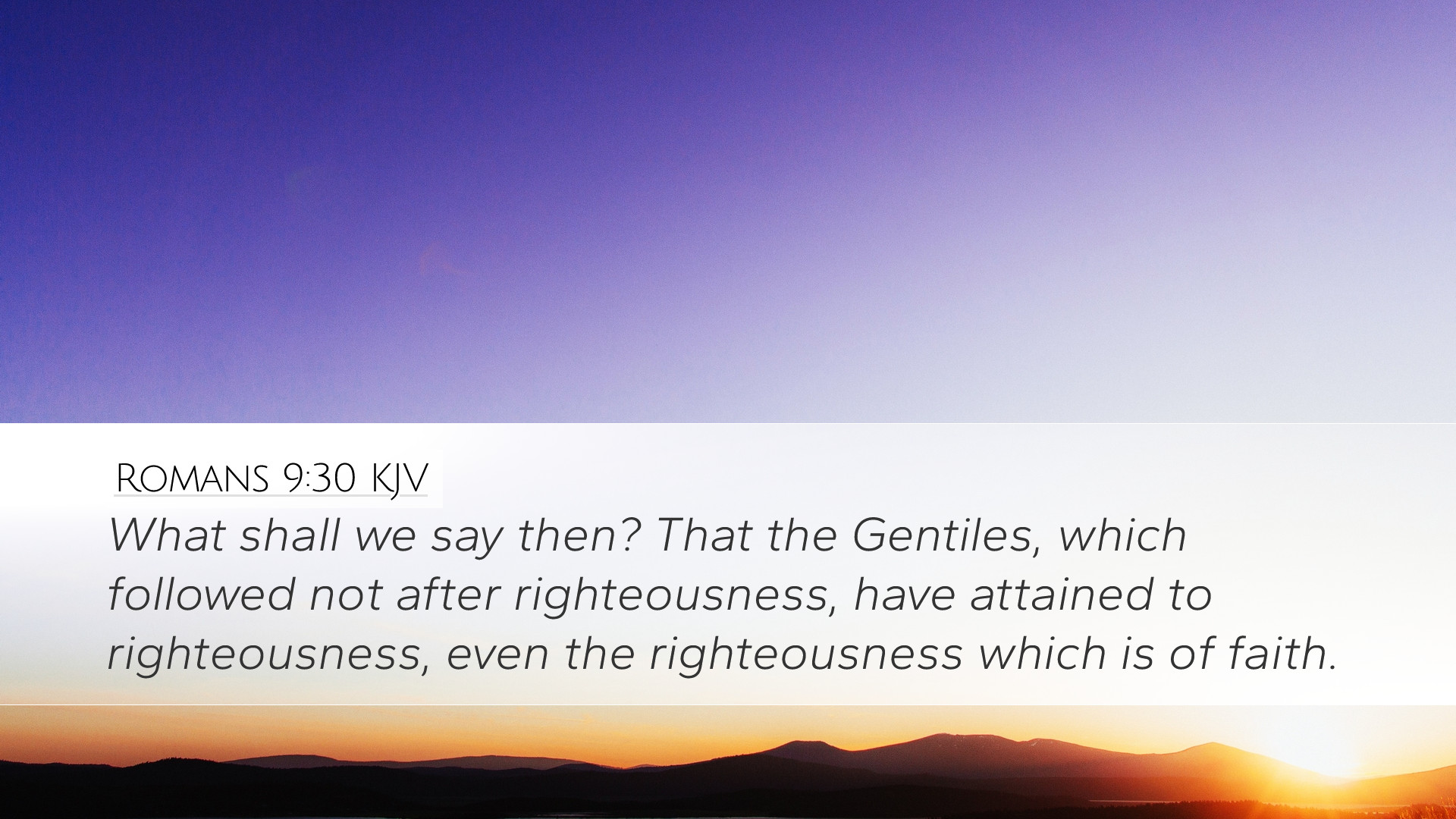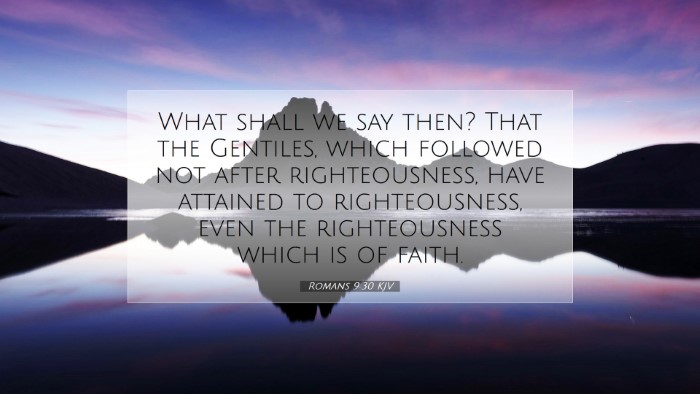Commentary on Romans 9:30
Romans 9:30 states: "What shall we say then? That the Gentiles, which followed not after righteousness, have attained to righteousness, even the righteousness which is of faith."
This verse marks a pivotal point in the discussion of God's righteousness and the role of faith versus works in salvation. Below is a summary of insights from public domain commentaries that shed light on this profound statement.
Contextual Overview
To appreciate the depth of Romans 9:30, it is essential to understand the surrounding context. Paul, addressing the Roman church, highlights the contrasting outcomes for the Jews and Gentiles regarding righteousness.
Matthew Henry's Commentary
Henry emphasizes that this verse showcases the grace of God, as the Gentiles, who had not actively sought after righteousness, attained it. He outlines the following key points:
- Nature of Righteousness: Righteousness is fundamentally a matter of faith rather than adherence to the law. The Gentiles, without the Mosaic law, sought God's favor and found it through faith.
- Divine Grace: Henry highlights the surprising nature of God's grace, which often bypasses the expected channels (i.e., the Jews, who were the chosen people) to include those who were previously considered outsiders.
- Response to Grace: The attainment of righteousness by the Gentiles serves as a reminder of the necessity of faith in every believer's life and that it is not by works that one is justified.
Albert Barnes' Commentary
Barnes provides a systematic analysis, explaining how the verse reflects God's justice and mercy. His interpretation includes:
- Gentile Righteousness: Barnes stresses that Gentiles, often neglected in religious discourse, found righteousness through faith, suggesting that God’s plan includes all humanity, regardless of their heritage.
- Contrast with Israel: He contrasts the pursuit of the law by the Israelites, who stumbled over the very law that was meant to lead them to righteousness, emphasizing that righteousness is a gift rather than a reward for efforts.
- Faith as a Key Component: The key message is that righteousness is received by faith, a theme pervasive throughout the epistles of Paul, pointing to the inclusivity of the gospel.
Adam Clarke's Commentary
Clarke's insights delve into the theological implications of this verse, explaining the significance of faith in the broader narrative of salvation:
- Inclusivity of the Gospel: Clarke notes that the inclusion of Gentiles validates the universal scope of the gospel and dispels the notion of exclusiveness based on ethnic or cultural lineage.
- Righteousness through Faith: He argues that true righteousness is not attained through the fulfillment of the law but through faith in Jesus Christ, underscoring the transformative power of believing.
- Implications for Believers: Clarke calls believers to embrace this righteousness and encourages ministers to convey the message that reaching God is accessible to all through faith.
Theological Implications
Romans 9:30 encapsulates a critical theological shift from a works-based righteousness to one achieved by faith. This verse anticipates the broader message of Romans, wherein Paul explains that salvation is available to all, Jew and Gentile alike.
Faith vs. Works
The crux of the discussion revolves around the distinction between faith and works:
- Faith as the Means of Salvation: Salvation is accessible through faith (Romans 1:16-17), emphasizing that human effort cannot earn divine acceptance.
- Works of the Law: Paul highlights the inadequacy of the Law for justification, as it serves only to reveal sin rather than provide a remedy for it (Romans 3:20).
Pastoral Applications
This verse and its interpretation remind pastors and church leaders of the necessity to preach the gospel of grace fervently:
- Encouragement for the Faithful: Emphasize that regardless of past failures or backgrounds, individuals can attain righteousness through faith in Christ.
- Outreach to the Unreached: Highlight the importance of reaching out to those outside the traditional church framework, as God’s grace extends beyond societal and cultural boundaries.
Conclusion
In summary, Romans 9:30 serves as a powerful reminder of God’s overarching plan for redemption, showcasing His grace toward both Jews and Gentiles. The insights from Matthew Henry, Albert Barnes, and Adam Clarke collectively underscore the message that righteousness is not a commodity to be earned but a gift to be received through faith. The call for all believers, pastors, and theologians is to live out and proclaim this profound truth, ensuring that the gospel remains inclusive, transformative, and rooted in the grace of God.


